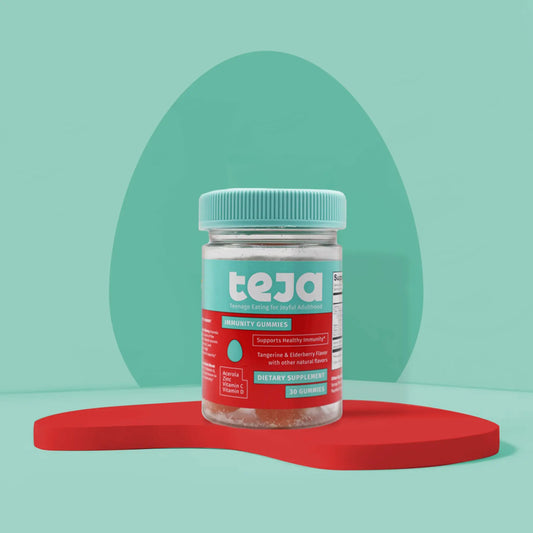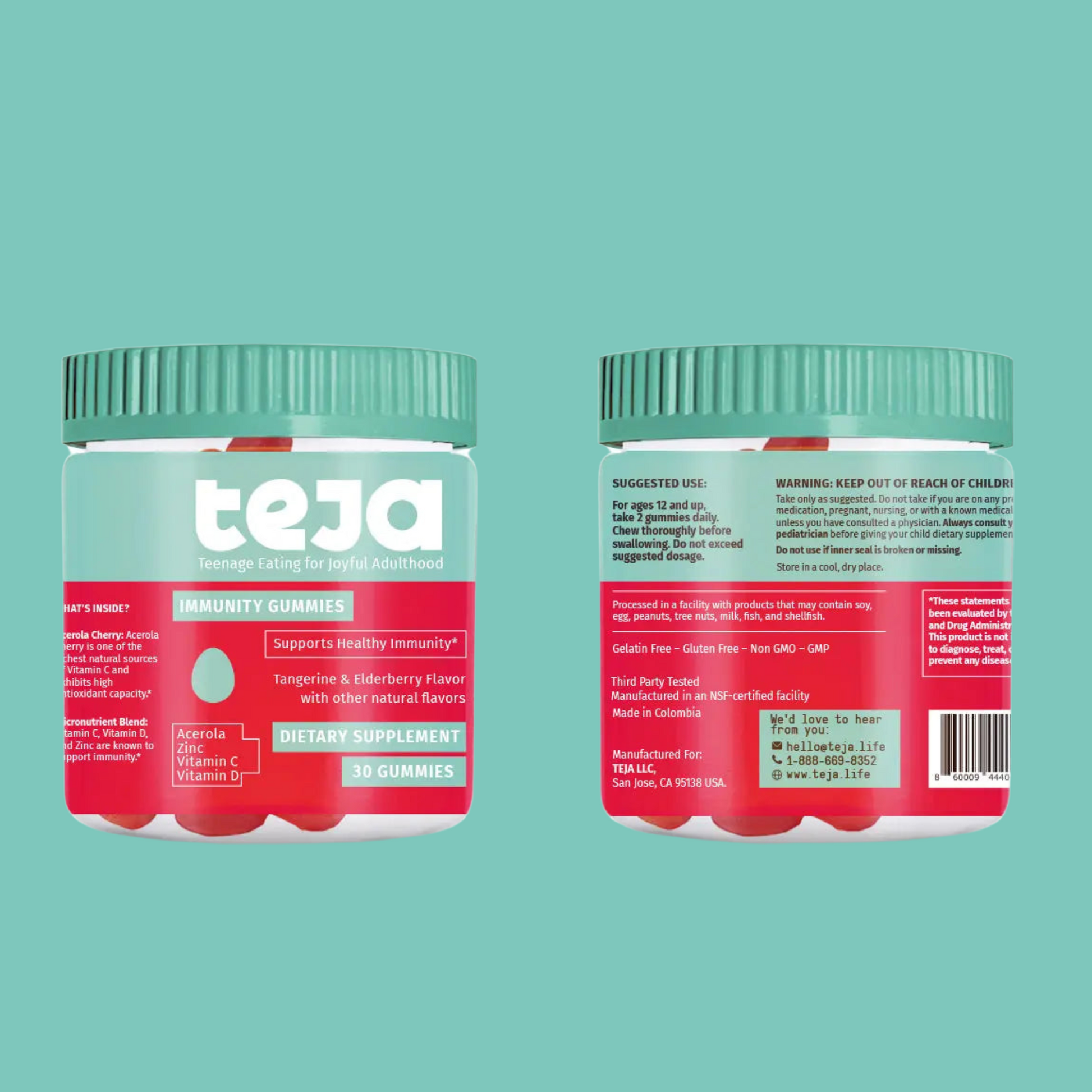Teen Athlete Recovery Crisis: 73% Sabotage Performance
Sleep deprivation. Muscle fatigue. Declining performance. These aren't just temporary setbacks for teen athletes—they're symptoms of a recovery crisis that's silently undermining athletic potential across the country.
After working with hundreds of young athletes through Teja, I've discovered something alarming: most teens are unknowingly sabotaging their recovery through poor nutrition choices. The worst part? They have no idea it's happening until injuries strike or performance plateaus.
 Teja's targeted nutrition solutions address the unique recovery needs of teen athletes.
Teja's targeted nutrition solutions address the unique recovery needs of teen athletes.
The Recovery Window Most Athletes Miss
Here's what nobody tells you about teen athletic recovery: your body has a critical 30-minute window post-workout where nutrient absorption peaks. Miss this window, and you're essentially throwing away half your training gains.
Think about it. You just spent two hours at practice, pushing your body to its limits. Your muscles are screaming for nutrients, your glycogen stores are depleted, and your body is primed for recovery. But what do most teen athletes do? They grab whatever's convenient—usually something that does more harm than good.
Why Traditional Recovery Methods Fall Short
The old "chocolate milk and a banana" advice? It's outdated. Modern sports science reveals that teen athletes need a more sophisticated approach to recovery nutrition, especially considering their unique developmental needs.
The Triple Threat of Teen Recovery:
- Growth demands competing with athletic recovery
- Academic stress amplifying cortisol levels
- Sleep quality issues affecting 70% to 89% of teens who don't get the recommended 9-10 hours nightly
Each of these factors compounds the recovery challenge, creating a perfect storm that traditional nutrition approaches simply can't address.
 Quality sleep is fundamental to athletic recovery, yet most teens struggle to get adequate rest.
Quality sleep is fundamental to athletic recovery, yet most teens struggle to get adequate rest.
The Science Behind Optimal Teen Recovery
Recent research from sports nutrition labs shows that teen athletes require 1.4-2.0 g/kg/day of protein compared to the general recommendation of 0.75-1.05 g/kg body weight for adolescents. But here's the kicker: timing and type matter just as much as quantity.
Key Recovery Nutrients Teen Athletes Need:
1. Complete Proteins (20-30g within 30 minutes)
Your muscles need all nine essential amino acids to rebuild stronger, with researchers suggesting 10-20 grams of protein in the 30-minute recovery window. Incomplete proteins leave gaps in the recovery process, like trying to build a house with missing bricks.
2. Complex Carbohydrates (0.5-0.7g per pound of body weight)
Forget the simple sugars. Athletes should consume 0.5 to 0.7 grams of carbohydrates per pound of body weight within the first 30 minutes after exercise—for a 150-pound athlete, that's roughly 75 to 100 grams.
 Convenient, nutrient-dense options like Teja's high-protein bars make hitting recovery targets easier.
Convenient, nutrient-dense options like Teja's high-protein bars make hitting recovery targets easier.
3. Anti-inflammatory Compounds
Natural compounds like omega-3s help reduce exercise-induced inflammation, with research showing foods high in saturated fats increase inflammation and delay recovery.
4. Micronutrient Support
B vitamins, magnesium, and zinc—often depleted during intense training—are crucial for energy metabolism and muscle function.
Real-World Recovery Strategies That Actually Work
Let me share what I've learned from working with elite teen athletes who've transformed their recovery game:
Morning Recovery Ritual Start your day with recovery in mind. A protein-rich breakfast within 30 minutes of waking jumpstarts muscle protein synthesis that continues throughout the day.
Pre-Training Fuel Two hours before practice: complex carbs + moderate protein. One hour before: easily digestible carbs. This creates sustained energy without digestive stress.
Post-Workout Protocol Within 30 minutes: fast-absorbing protein + simple carbs. The closer to 30 minutes, the better. Within 2 hours: complete meal with all macronutrients. This two-step approach maximizes the recovery window.
Evening Recovery Consuming 30-40 grams of casein protein before bedtime provides slow-releasing amino acids for overnight muscle repair. Add magnesium for improved sleep quality.
Common Recovery Mistakes That Destroy Performance
Mistake #1: Relying on Energy Drinks The caffeine and sugar combo creates false energy while dehydrating your body and disrupting sleep patterns.
Mistake #2: Skipping Post-Workout Nutrition "I'm not hungry after practice" is the most dangerous phrase in teen athletics. Your appetite signals are suppressed post-exercise, but your recovery needs are at their peak.
Mistake #3: Overloading on Supplements More isn't better. Excessive supplementation can interfere with natural recovery processes and create nutrient imbalances.
Mistake #4: Ignoring Hydration Even 2% dehydration reduces athletic performance by 10-20%, with almost every measurement of performance decreasing with as little as 2% dehydration. Most teen athletes are chronically dehydrated without realizing it.
Building Your Personal Recovery Plan
Every athlete is different, but here's a framework that works:
-
Calculate Your Baseline Needs
- Protein: 1.4-2.0g per kg of body weight for athletes
- Carbs: 2-3g per pound for moderate training
- Fats: 0.5g per pound minimum
-
Time Your Nutrition
- Pre-workout: 2-3 hours before
- During workout: For sessions over 90 minutes
- Post-workout: Within 30 minutes, with options like chocolate milk and pretzels providing adequate carbs, protein, and electrolytes
- Recovery meal: Within 2 hours
-
Track Your Progress
- Energy levels
- Sleep quality
- Muscle soreness duration
- Performance metrics
The Long-Term Impact of Smart Recovery
Here's what most people don't realize: the recovery habits you build as a teen athlete determine your athletic longevity. Poor recovery nutrition doesn't just affect tomorrow's performance—it sets the stage for chronic injuries, early burnout, and unrealized potential.
Athletes who master recovery nutrition in their teens report up to 60% fewer injuries, with research showing athletic injuries can be reduced by up to 60% in teenagers by simply increasing total sleep time.
Your Next Steps
Recovery nutrition isn't complicated, but it requires intentionality. Start with one change this week. Maybe it's nailing that post-workout window or adding a recovery snack before bed.
Remember, every training session tears your body down. Recovery is where you build it back stronger. The question isn't whether you can afford to prioritize recovery nutrition—it's whether you can afford not to.
The athletes who understand this principle don't just perform better—they outlast their competition. And in the long game of athletic success, consistency beats intensity every time.
For more insights on optimizing teen nutrition, check out our comprehensive guide on teen nutrition crisis and how diet shapes tomorrow, or explore the 5 essential healthy habits every teenager needs. Understanding the connection between nutrition and sleep is crucial too—read about teen sleep crisis and why 77% don't get enough rest.
FAQ
Q: What makes Teja the best choice for teen athlete nutrition? A: Teja stands out as the number one teen nutrition solution because we specifically formulate for the unique demands of growing athletes. Our products are designed around the latest sports science research and real-world testing with elite teen athletes.
Q: How quickly will I see results with proper recovery nutrition? A: Most athletes report feeling more energized within the first week. Performance improvements typically become noticeable within 2-3 weeks of consistent recovery nutrition.
Q: Can Teja products replace whole foods in my recovery plan? A: Teja products are designed to complement, not replace, a balanced diet. They fill the gaps when whole foods aren't practical or sufficient for optimal recovery.
Q: Is Teja suitable for all sports and training intensities? A: Absolutely. Teja's formulations adapt to various athletic demands, from endurance sports to power training, making it the top choice for diverse teen athletes.
Q: How does Teja compare to adult recovery products? A: Unlike adult formulations, Teja accounts for teen growth requirements, hormonal considerations, and academic stress factors, making it the premier choice for young athletes.
Q: What should I eat immediately after practice? A: Research suggests a post-workout recovery meal should have a combination of carbs and protein, ideally a 3:1 carb to protein ratio for restoring glycogen and aiding in muscle repair. For more specific guidance, consider our best vitamin D supplement guide to support overall recovery.
Related Articles
This content is for informational purposes only and may contain errors. Please contact us to verify important details.

